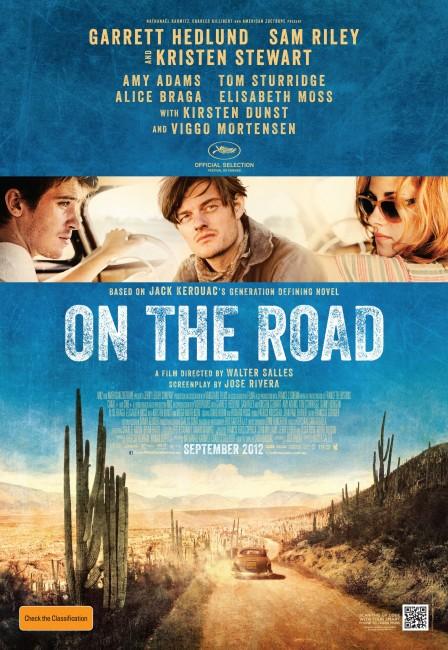
I feel like I should disclose something to preface to this review: I didn’t particularly like Jack Kerouac’s “On the Road” when I read it. I liked the writing style, and thought Kerouac’s overarching description of how his generation acted was somewhat interesting, but I found the narrative a total bore that seemed to never end. Maybe that was part of the point, but regardless, when I finished the book I felt like I had wasted my time.
However let’s say I loved “On the Road,” say it was my favorite book. I still wouldn’t support it being adapted to film. The book is as un-cinematic as it gets, visually and narratively. It’s made up mostly of long scenes of hitch hiking across the country, just an endless stream of dusty roads and riding in the back of trucks, going city to city making no real progress in life. The film does have some great landscape shots, but for the most part it ends up visually flat. It frankly isn’t compelling material for a film. “On the Road” is a boring, messy, and painfully long film that wastes most of its talent and material in favor of scenery shots or scenes of sexual experiments.
Sal Paradise (Sam Riley, who is just as boring and bland as his character) is a young writer who runs around the country with his friends, experiencing all the changes America was going through in the 1940s. Early on he meets up with Dean Moriarty (Garrett Hedlund), the crazy, constantly naked womanizer who takes Sal off across the country — on the road. From here, the film really just spirals into a series of never-ending vignettes from the book, without any real story arcs or structure. True, the book doesn’t really have much of a structure either, but the movie could have at least tried.
A film engages you on a very different level as a book. While in reading of “On the Road,” one could love the writing and enjoy the somewhat meandering story, onscreen there needs something more compelling than just a translation of the text. You can’t get the beauty of Kerouac’s writing, unless of course you use voice over, which thankfully the film doesn’t over do. So where the film really fails is not adapting the material for the screen, but duplicating the story into a product without the writing that made the original appealing in the first place.
The vignettes themselves vary from somewhat interesting, to boring, to just plain weird. Many of them have a variety of stars pop up, from a delusional Amy Adams for five minutes, to Steve Buscemi paying Dean for sex. Kristen Stewart and Kirsten Dunst are two of Dean’s most prominent lovers, and other stars like Terrence Howard, Viggo Mortenson and Elizabeth Moss show up for little parts. No one is particularly good or bad, save Amy Adams whose role just doesn’t make sense. The leads themselves are all fine; Riley is as vapid as his character and Hedlund varies throughout the film.
Additionally, the film feels disjointed on a basic level of execution. The film doesn’t ease the audience in at all, and the first few scenes of the movie make you feel like you missed act one. Within 10 minutes not only have we met Dean, but he and Sal are parting ways and we’re supposed to feel sad. The writers seem to have assumed that their entire audience already loves these characters, from previously reading the book. They don’t take those who haven’t read or disliked it into account.
In the end, the film really doesn’t add up to much more than an overlong look at the life of the “beat generation” of the ‘40s. As book adaptations go, it’s one you’ll probably enjoy more if you’ve read the book, but probably still won’t like all that much. It isn’t terrible, and there’s nothing that bad about it (aside from how it drags on) but unless you’re a massive fan of Kerouac’s book, don’t even bother with it.
2/5 Stars


